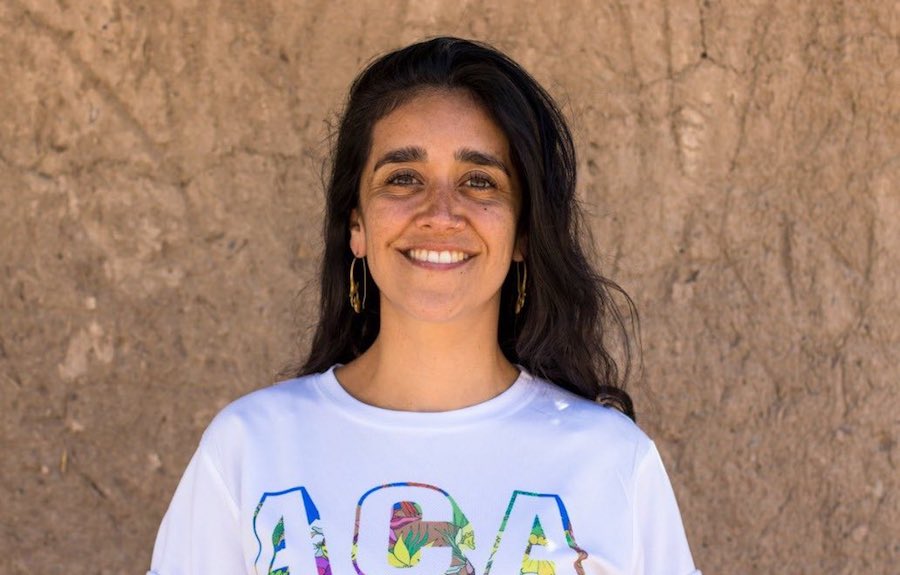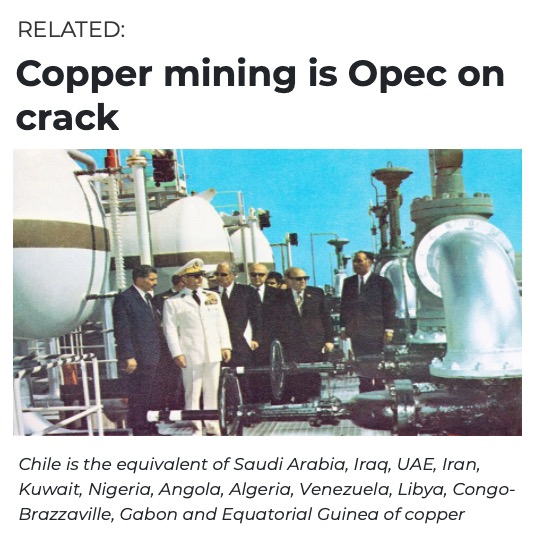“Mining has brought nothing but poverty” – young environmentalists plan rewrite of Chile copper mining rules

Environmental activists like Constanza San Juan have been peripheral figures at best in Chile’s emergence as the dominant supplier of copper over the past few decades. Now, she and others like her are rewriting the rules, with tens of billions of dollars in investments riding on the outcome.
The 35 year old, who’s been fighting mining ever since Barrick Gold Corp. arrived to her region two decades ago, is on a committee that will decide how the environment and natural resources will figure in a new constitution to replace the one that dates back to the dictatorship of Augusto Pinochet.
“We need to completely change the extractivist model to one that is in harmony with nature,” San Juan said in an interview, vowing not to meet with lobbyists during the process. “Changes must be done in the spirit of what started this whole movement to transform Chile. Mining has brought nothing but poverty.”
Deliberations will begin in earnest early next year, with members likely to be emboldened by Sunday’s election of the most left-leaning president since Salvador Allende. Proposals range from setting time limits on concessions to banning mines altogether under some conditions. The copper industry is pushing hard to retain the indefinite concession model, which it says is critical for long-term planning that underpins investments.
There’s a lot at stake. Chile’s government lists a total of almost $70 billion in possible mining projects this decade. Some of that will depend on how the new constitution turns out and whether it’s ratified in a referendum. As such, the document will help determine how much of the world’s biggest copper and lithium reserves will be tapped in the coming years to meet rising global demand in the transition away from fossil fuels.
“Until this is clarified — the issue of legal security and any new rules — we’re not going to see large investments,” said Diego Hernandez, head of Chilean mining society Sonami.
Committee members
A quick look at the makeup of the committee — and that of the broader 155-person constitutional assembly — explains the industry’s fears. In a process born from street protests that erupted two years ago, about three quarters of the committee are left-wing or social and environmental activists of some kind. That means conservatives gunning for a continuation of investor-friendly rules are in a clear minority.
For example, there’s 26-year-old independent Juan Jose Martin, who co-founded a sustainability youth organization; Camila Zarate, 29, an environmental lawyer who advocates for water rights; and San Juan, who sees sustainable mining is a contradiction in terms and calls for a ban on all mines near water sources, including glaciers and salt flats that hold much of the world’s lithium reserves.
San Juan’s views were shaped by the aborted attempt by Barrick to develop a giant open pit at the top of her valley. Construction was halted in 2013 amid environmental breaches that led to fines and lawsuits. “Technology allows mining companies to go all the way up to the glaciers and we won’t allow that because that’s where 70% of the country’s water comes from,” she said.
Election results
Mining companies have more at risk from constitutional reform than from the presidential election, according to Hernandez. While companies probably would have fared better under conservative candidate Jose Antonio Kast than left-wing President-elect Gabriel Boric, an evenly split congress limits the likelihood of radical policies.
The copper industry, which accounted for more than half of Chile’s exports last year and 11% of GDP, is responding to mounting pressure to find cleaner ways to operate. Producers have also indicated a preparedness to pay more taxes for social spending, as well as adhere to stricter exploration rules. But the industry says sticking to the indefinite concession model is crucial for planning.
“No company estimates their cash flow looking four years ahead,” BTG Pactual analyst Cesar Perez-Novoa said. “Worst case scenario, it’s a 15-year horizon and best case, 30 to 50. The constitution is what’s important here, not the president.”
The industry is encouraged by the make-up of congress, not only because it’s set to moderate policy, but also because it suggests the electorate may not sign off on radical constitutional reform. Even activist San Juan, speaking before Sunday’s presidential election, indicated that the exuberance for change when the assembly was elected may have waned a little. Still, Boric’s landslide victory Sunday may help rekindle some of that momentum.
Hernandez, a former chief executive of Codelco and Antofagasta Plc., is also banking on people recognizing that mining will have to play a big role in keeping the economy going after the impact of pandemic stimulus peters out.
Still, major mining companies including Freeport-McMoRan Inc. and Lundin Mining Corp. have said they won’t be pulling the trigger on new investments in Chile until the political and regulatory environment becomes clearer.
(By James Attwood and Alvaro Ledgard)
{{ commodity.name }}
{{ post.title }}
{{ post.date }}





3 Comments
Matt
Really? Grapes is enough to sell and give everyone a living? I think you know nothing about poverty.
Robert Colombo
couldn’t agree more with [MATT]. They better be careful of how the tax and take money from the miners. All she has to do is look at downtown Santiago to see what mining prosperity looks like. Decades ago, I learned this from a sheepherder: “you can shear a sheep many times, but you can only skin it once”. Be careful with your scissors madam.
Steve Noakes
This is happening around the world. The Trudeau government in Canada has just appointed a former Greenpeace activists as federal Environment Minister.
A wide demographic of the world has grown up with all the benefits of metals in their modern lives with no clue or interest in knowing where they come from or how it becomes their latest toy.
The mining industry has done an abysmal job over the last 40 years that I have been involved (and my father’s 28 years) at promoting itself or showing the connection between holes in the ground and their mechanical and electrical world. They have relied on associations to fight the battles. Many of those groups have never shown any genuine passion for promoting and fighting for our industry. They are made up of people with little experience in the business but are hired on administrative and network affiliations. They bounce around more in the mining echo chamber than getting out and into the faces of those who challenge the existence of our industry. Media and people like Constanza are free to spew any story against mining with no fear or retribution. The mining industry shrugs and thinks it’s big enough to shed the damage. But it’s been a slow death by a thousand media cuts. Many in the industry at a level to direct challenges to these forces are at a stage in their career that their pension will not be affected by the industries demise. And many do not have true passion for the industry to care, so long as their personal corporate trajectory isn’t affected.
The soft approach hasn’t worked for 50 years. We have lost many public opinion battles and have lost the war in many countries. Influencing political bodies with promises of tax riches is trumped by international media coverage of protests and blockades with the subsequent melting of political support.
It’s time to challenge the BS from armchair wilderness eco-warriors directly or face a future of more Colonial Environmentalism where our populations expect us to mine other countries and bring the spoils home to their immaculate backyard.
It’s time for people to take environmental responsibility for their own consumption.